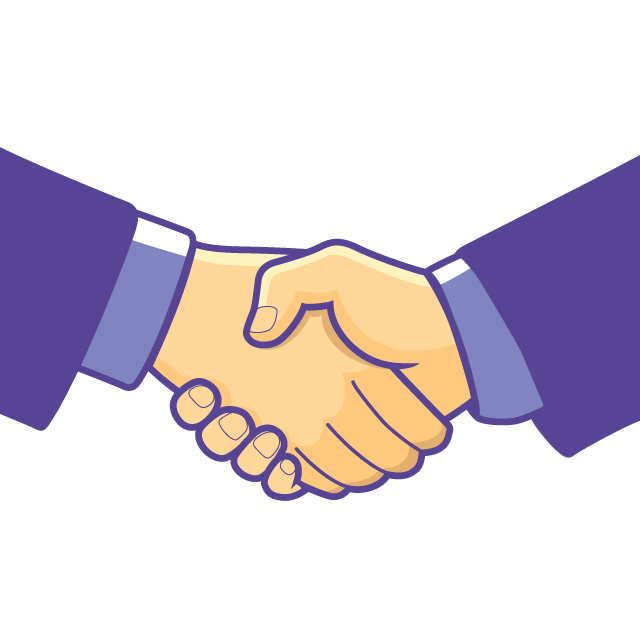Are You Tongue Tied At Networking Events?
"All business is people business." So says business consultant Brian Tracy – and he's on the money.
As a freelancer, all your clients are people, whether or not they happen to run a business. To keep a steady flow of clients coming through your doors, you need a way of connecting with the people who need your services.
One of the most effective ways of meeting potential clients is by attending networking events.
But what if you're not a people person? Maybe you're a freelancer because you enjoy working for yourself and by yourself. Or perhaps you're not naturally outgoing…

Whatever your reasons, finding yourself tongue-tied at networking events can leave you feeling overwhelmed or inadequate as a freelancer. Worse, it can put you off attending future networking events, which is bad for your business.
Fortunately, there are simple strategies you can follow to help you find the right words to say, whoever you're talking to.
Let's dig into these strategies to see how you can apply them.
1. Treat Networking Events as Conversation Practice
If you know your conversation skills need polishing, the best thing you can do is practice. The only way you can do this is by interacting with people. What better place to do this than at networking events? People at networking events want to talk to you, so it's the perfect environment for developing your conversation skills.
Networking for conversation practice has another advantage. As Woody Allen is alleged to have said: "Eighty percent of success is showing up." Just by being present at networking events, you'll find that you meet interesting people. As a consequence, your network grows. You may also find that your fears of being tongue-tied were unfounded and that the conversation flows naturally.
The next time you find yourself fearful about a networking event, tell yourself: "I don't have to be perfect; this is just practice."
2. Be a First Mover
There are few feelings worse than standing alone while everyone around you is engaged in lively conversation.
So why, when we see other people standing alone, are we afraid to approach them? Chances are, they're hoping someone will talk to them.
If you find yourself alone at a networking event, don't stand around waiting for someone to come to you. Look around for someone to talk to. Head over and introduce yourself. Most people will be delighted that you reached out.
As a bonus, being the one who makes the first move gives you a big confidence boost. When you feel confident, you're less likely to end up tongue-tied.
3. Use Detonator Questions
Once you've introduced yourself to someone, the easiest way to get the conversation flowing is to ask detonator questions. These explode the conversation into life. That's because they require a story or anecdote to answer them.
Here are some great detonator questions that work well early on in a conversation.
- What's your connection to this event?
- How do you know the host?
- Tell me more about your business.
- What does your work look like, day-to-day?
4. Press (and Reveal) Hot Buttons
Detonator questions are a good starting point. But where should you take things from there?
The answer is to find the hot buttons of your conversation partner. Everyone has something they love to talk about. And they'll usually drop hints about these hot buttons into the conversation. For example, they might mention a vacation they've just returned from, or a project they've recently started.
The concept of hot buttons was first observed by conversation expert Don Gabor. As Gabor explains in How to Start a Conversation and Make Friends:
Hot buttons can be work, a new job, a hobby, a career goal, an upcoming trip, a sporting activity, a personal dedication to a social cause… [They] can be a lifelong interest, a passing fancy or a current fascination — whatever turns you on! It’s important to find other people’s hot buttons as soon as possible because these strong interests are extremely fertile areas for sustained conversation.
Questions that can help you discover hot buttons include:
- What do you like to do in your down-time?
- What do you do to relax?
- Have you started any new projects lately?
- What are your favorite things about your business?
Once you've found your conversation partner's hot button, follow it up with appropriate detonator questions.
Also, it's important to be aware of your own hot buttons and to take care to slip your own hot button hints into the conversation. If you're the only one asking questions, the conversation becomes one-sided.
5. Have a Story Box
"It's all very well to ask good questions," you probably think, "but what if I have to answer questions? That's what really leaves me tongue-tied."
As I mentioned in the first strategy, the best solution to this is practice.
The other solution is to build up a "story box." This is a collection of simple stories you have ready to drop into any conversation. They can be from your work or personal life.
Tips for filling your "story box"
- Find stories that address common situations. For example, you'll often be asked at networking events, "How was your journey here?" And you'll find that other people tell you about their journeys to the event. So have a story prepared about one of your most memorable journeys.
- Choose stories that drop your hot buttons into the conversation.
- Stories need practice. Only by practicing your stories will you find ways of telling them that grab the attention of your conversation partner.
Your Call
Are you someone who finds networking events difficult? If so, how do you deal with your fears?
Or maybe you enjoy networking events. How do you approach networking so that it's fun for you?
Share your tips and strategies in the comments section below.
comments powered by Disqus


